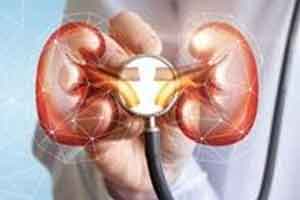- Home
- Editorial
- News
- Practice Guidelines
- Anesthesiology Guidelines
- Cancer Guidelines
- Cardiac Sciences Guidelines
- Critical Care Guidelines
- Dentistry Guidelines
- Dermatology Guidelines
- Diabetes and Endo Guidelines
- Diagnostics Guidelines
- ENT Guidelines
- Featured Practice Guidelines
- Gastroenterology Guidelines
- Geriatrics Guidelines
- Medicine Guidelines
- Nephrology Guidelines
- Neurosciences Guidelines
- Obs and Gynae Guidelines
- Ophthalmology Guidelines
- Orthopaedics Guidelines
- Paediatrics Guidelines
- Psychiatry Guidelines
- Pulmonology Guidelines
- Radiology Guidelines
- Surgery Guidelines
- Urology Guidelines
Poor Kidney Function Linked to Higher Cancer Risk

Washington, DC — A new study has uncovered a modestly higher cancer risk in individuals with mild to severe chronic kidney disease, driven primarily by skin (non-melanoma) and urogenital cancers. The findings, which appear in an upcoming issue of the Clinical Journal of the American Society of Nephrology (CJASN), do not prove a causal link between kidney dysfunction and cancer but might be used to increase awareness among healthcare professional and patients, motivate lifestyle modifications if other cancer risk factors or family history are present, and justify more vigilant monitoring.
Kidney dysfunction leads to retention of metabolic waste products, which can have varying effects on diverse processes in the body. Some studies have indicated that kidney dysfunction may affect an individual’s risk of developing heart disease, anemia, bone fractures, and possibly cancer.
To look for a potential link between kidney dysfunction and cancer, Hong Xu, MD, PhD (Karolinska Institutet, in Sweden) and her colleagues conducted a comprehensive analysis of the risk of cancer across the full spectrum of kidney function in a large representative population of Swedes aged 40 years and older with no priory history of cancer.
In the analysis of 719,033 adults who were followed for a median of 5 years, 64,319 cases of cancer (affecting 9% of participants) were detected throughout.
3,338,226 person-years. (A person-year is the number of years of follow-up multiplied by the number of people in the analysis.) The relationship between kidney function and cancer incidence was U shaped. Compared with eGFR of 90-104 ml/min, lower eGFR strata associated with a higher cancer risk: an 8% higher risk for eGFR 30-59 ml/min and a 24% higher risk for eGFR less than 30 ml/min. After assessing biases, the researchers observed a sustained higher risk after 12 months follow-up for the incidence of skin (non-melanoma) and urogenital cancers.
“Establishing these associations do not prove causation, but evoke awareness and stimulate thinking on mechanisms, prevention, and screening opportunities,” said Dr. Xu. “From a public health point of view, these results may help health care policy makers to develop appropriate strategies for cancer screening and monitoring in the context of chronic kidney disease as well as help health service planning. From a research point of view, these results provide previously unknown associations—such as a higher skin cancer risk—and may stimulate further studies on the topic.”
Study co-authors include Kunihiro Matsushita, MD, PhD, Guobin Su, MD, Marco Trevisan, MSc, Johan Ärnlöv, MD, PhD, Peter Barany, MD, PhD, Bengt Lindholm, MD, PhD, Carl-Gustaf Elinder, MD, PhD, Mats Lambe, MD, PhD, and Juan Carrero, PhD.
Disclosures: Dr. Ärnlöv reports personal fees from lecturing fees for Astrazeneca, outside the submitted work. Dr. Lindholm reports grants, personal fees, non-financial support and other from Baxter Healthcare Corporation, during the conduct of the study; grants, personal fees, non-financial support and other from Baxter Healthcare Corporation, outside the submitted work. Dr. Matsushita reports grants and personal fees from Kyowa Hakko Kirin, personal fees from Akebia, outside the submitted work. Dr. Carrero, Dr. Barany, Dr. Elinder, Dr. Lambe, Dr. Su, Dr. Trevisan, and Dr. Xu have nothing to disclose.
The article, entitled “Estimated Glomerular Filtration Rate and the Risk of Cancer,” will appear online at http://cjasn.asnjournals.org/ on March 14, 2019, doi: 10.2215/CJN.10820918.
The content of this article does not reflect the views or opinions of The American Society of Nephrology (ASN). Responsibility for the information and views expressed therein lies entirely with the author(s). ASN does not offer medical advice. All content in ASN publications is for informational purposes only, and is not intended to cover all possible uses, directions, precautions, drug interactions, or adverse effects. This content should not be used during a medical emergency or for the diagnosis or treatment of any medical condition. Please consult your doctor or other qualified health care provider if you have any questions about a medical condition, or before taking any drug, changing your diet or commencing or discontinuing any course of treatment. Do not ignore or delay obtaining professional medical advice because of information accessed through ASN. Call 911 or your doctor for all medical emergencies.
Since 1966, ASN has been leading the fight to prevent, treat, and cure kidney diseases throughout the world by educating health professionals and scientists, advancing research and innovation, communicating new knowledge, and advocating for the highest quality care for patients. ASN has more than 20,000 members representing 131 countries. For more information, please visit www.asn-online.org or contact the society at 202-640-4660.

Disclaimer: This site is primarily intended for healthcare professionals. Any content/information on this website does not replace the advice of medical and/or health professionals and should not be construed as medical/diagnostic advice/endorsement or prescription. Use of this site is subject to our terms of use, privacy policy, advertisement policy. © 2020 Minerva Medical Treatment Pvt Ltd